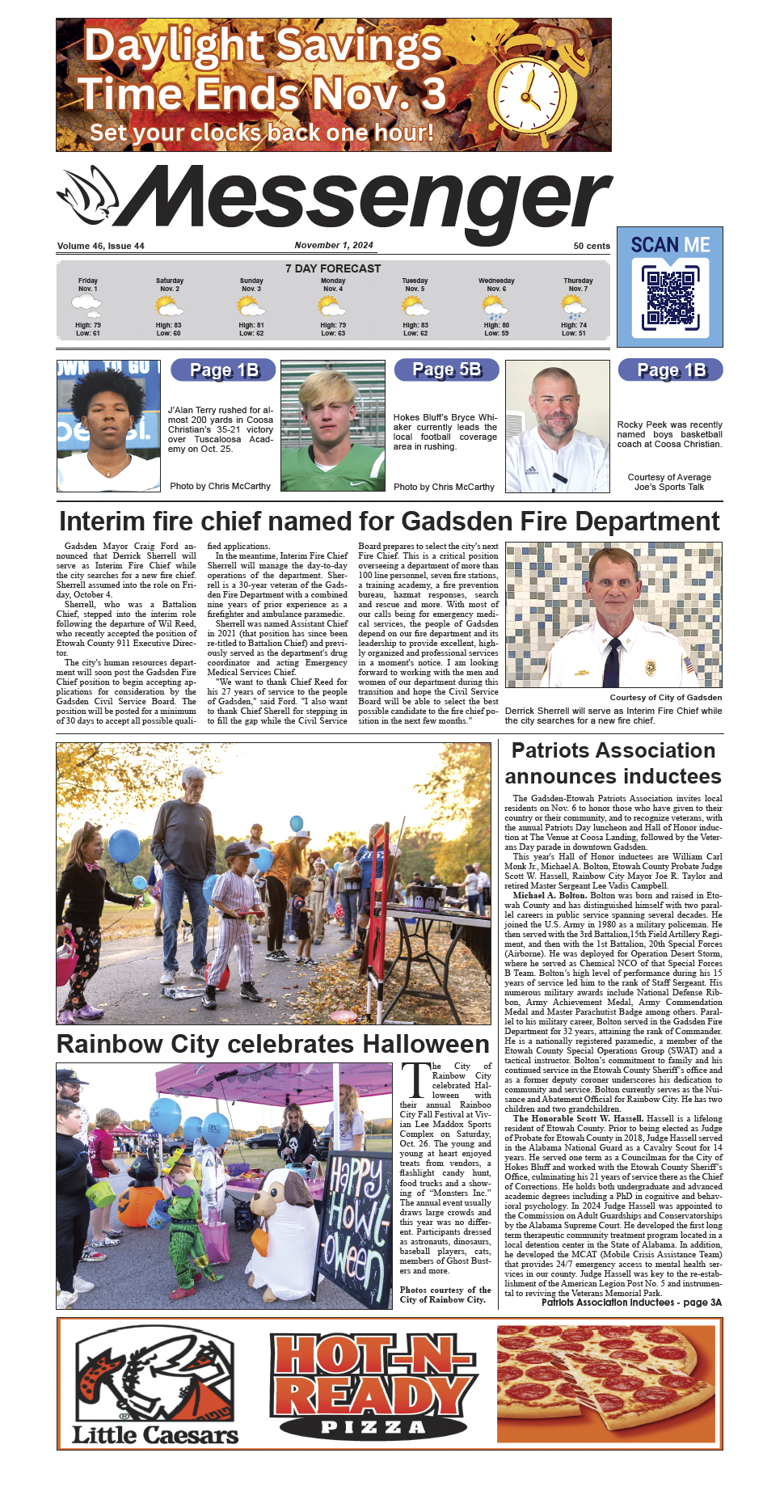By Danny Crownover
Albert E. Paschal came to Gadsden in 1879. At about that same time, he bought the lot and built the home that he was to occupy for many years. For a long time, the residence was used as a club house by the Elks. The lodge moved out when it built its new home on First Street between Broad and Locust streets.
“Uncle Ab,” as he was universally known, was born in Wilkes County, Ga., on March 24, 1849. In 1853, his parents moved to Barbour County, Ala. In 1863, the family moved to Russell County. It was there that Paschal became acquainted with the Kyle family in Columbus, Ga. It is thought that Paschal came to Gadsden through the influence of the Col. R.B. Kyle. They were lifelong friends. In fact, Paschal worked as a clerk in the Kyle store in Gadsden until he went into business for himself and became a merchant at Tunnel Block, located on north side of Broad Street near Sixth Street.
In 1879 Paschal married Lizzie Cooper of Russell County. The couple never had any children.
After the big Gadsden fire of 1883, Paschal bought the lot on the southwest corner of Broad and Third streets and erected a brick building for a hotel called The Phoenix. It’s sign on the wall on the Third Street side was one of the largest in the state. When the property was sold to T.L. Johnson, the hotel became the Johnson House.
The hotel’s dining room was on the ground floor where the Usry Drug Store was once located. Originally the building had a balcony running the full length of the second story.
Paschal was a merchant, preacher and teacher who taught school in various sections of Etowah County. He eventually entered Howard College in Birmingham to prepare himself for the ministry. Paschal never became a regular pastor but was always a faithful worker in the Baptist church. He built a little church in Owl Valley known as Paschal Mission.
Paschal acted as pastor for several churches and filled in for those pastors who be-came ill or went on vacation. He organized and conducted Sunday schools, and it is likely that he built other churches and sponsored the building of more than one school.
Paschal was a man of intense energy and was always on the go. He was continually bouncing around from one place to another. He was a tireless worker and seemed to be busy all the time and always in a hurry. He was a man of exemplary habits and his character was of the highest.
Paschal operated a store on practically every block of Broad Street at one time and another. They were all country stores. Every one of them had the hide of some fur-bearing animal hanging out in front, for Paschal dealt in hides of all kinds. He usually kept beaver, mink and cow hides hanging out in his store.
In talking about some store locations in the good old days, a group of old timers found that when almost any block downtown was mentioned, somebody could remember that Uncle Ab Paschal had operated a store in it. All of them remembered his familiar sign of a coonskin hanging over his doorway. He probably sold and bought more hides of fur bearing animals than any man in Gadsden. At his stores, Paschal generally had cakes of wax and tallow out front, along with plow gear, well ropes, millet seed and the like.
Paschal also opened a livery stable in the old King barn on Fourth Street where the Firestone building now stands. He also purchased the pottery works store on North 12th Street from H.B. Harvey, who moved to Birmingham to establish a similar store.
Paschal was one of the drivers of the horse cars on the first street railway built in Gadsden and was a conductor on the dummy line when it ran from Gadsden to Attalla on the N.C. & St. Louis tracks. He also once served as an alderman.
Paschal was the source of many interesting stories, some of them true. Jules Graul’s comic opera troupe, which was well stocked with pretty chorus girls, got off the Southern train in Atalla and boarded the dummy cars for Gadsden for a performance at Kyle’s Opera House. The troupe went through Alabama City, which at that time was all woods and no houses. As the dummy cars came through that section, the chorus girls began to speculate where they were going. They found that Paschal was susceptible to feminine charms, so much so that he had trouble collecting the fares.
Paschal became so excited that he pulled the cord that stopped the dummy cars. The chorus girls wanted to know why, as did the conductor and the engineer and fireman.
Paschal told them that he stopped the cars so that he might collect the fares. He was the image of politeness and tried to answer all questions put to him by the girls, who delayed him as much as possible. He had never had so many passengers on one run.
In his declining years, Paschal built a residence at Forrest Avenue and 11th Street. His last mercantile venture in Gadsden was a small store in the rear of his home. A dried hide of a raccoon on the door jamb served as the only sign for the store.
Paschal died on December 10, 1934 at the age of 85. He is buried in Hurtsboro in Russell County. In 1951, wreckers tore down the old Paschal residence.




